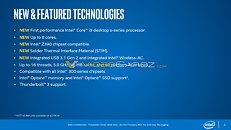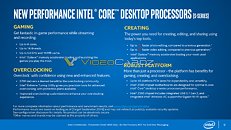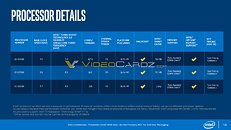Friday, August 17th 2018

Intel Confirms Soldered IHS for 9th Gen Core Series
Soldered integrated heatspreader has been a longstanding demand of PC enthusiasts for Intel's premium "K" mainstream-desktop processors. With AMD implementing it across all its "Summit Ridge" and "Pinnacle Ridge" Ryzen AM4 processors, just enough pressure for built on Intel. The company, in a leaked slide, confirmed the feature-set of its upcoming 9th generation "K" Core processors, which highlights "STIM" (soldered thermal interface material) for this chip. It shows that STIM could be exclusive to the "K" series SKUs, namely the i9-9900K, i7-9700K, and i5-9600K.
The slides also list out the clock speeds and cache sizes of the three first 9th generation desktop SKUs, confirming that the Core i7-9700K will indeed be the first Core i7 desktop SKU ever to lack HyperThreading. The TDP of the 8-core chips don't seem to breach the 95W TDP barrier Intel seems to have set for its MSDT processors. The slides also seem to confirm that the upcoming Z390 Express chipset doesn't bring any new features, besides having stronger CPU VRM specifications than the Z370. Intel seems to recommend the Z390 to make the most out of its 8-core chips.
Source:
VideoCardz
The slides also list out the clock speeds and cache sizes of the three first 9th generation desktop SKUs, confirming that the Core i7-9700K will indeed be the first Core i7 desktop SKU ever to lack HyperThreading. The TDP of the 8-core chips don't seem to breach the 95W TDP barrier Intel seems to have set for its MSDT processors. The slides also seem to confirm that the upcoming Z390 Express chipset doesn't bring any new features, besides having stronger CPU VRM specifications than the Z370. Intel seems to recommend the Z390 to make the most out of its 8-core chips.



93 Comments on Intel Confirms Soldered IHS for 9th Gen Core Series
It's also kinda silly all the bitching about HT in this thread, considering the top model is still endowed with it. There has always been two K models since K models have been a thing, one with and one without HT; Coffee Lake being the exception, which has 3 models, a quad with no HT, a hex with no HT, and a hex with HT. Also, all HEDT chips have had HT, with the one exception of that i5 Kaby Lake chip. Ryzen 5 and up has SMT. Threadripper has SMT. Nobody is taking HT away. Who is buying these chips that also needs HT anyway? If you really need all those threads, you should either be looking at Threadripper, x299, or a proper server setup if you really need 9001 threads. If you demand top single thread performance AND threads, then the 9900k is for you. Beyond that you'll have to prioritize your needs/wants. You can't have super high core counts and super high clock speeds at the same time, unless you get a x299 chip, a serious cooling system, and a bit of luck in the silicon lottery wouldn't hurt. It's been that way since the beginning of time. Remember all those debates about whether C2D or C2Q was better because C2D was hitting higher clock speeds, but C2Q had 4 cores instead of 2? Same difference today, just bigger numbers. It's like asking for a Mack truck that also could also outrun all the other vehicles at the Daytona 500, or a 747 that can outmaneuver an F-22.
People on the spectrum are often extremely clever.
trog
7-series - i3: 2C+HT, i5: 4C, i7: 4C+HT
8-series - i3: 4C, i5: 6C, i7: 6C+HT
9-series - i3: 4C, i5: 6C, i7: 8C, i9: 8C+HT
Higher segment (iN) means better total performance, assuming (correctly) that 1C/2T < 2C/2T.
If you'll think about it long enough, you should (hopefully) arrive at a conclusion that activating HT on other CPUs makes no sense. :-)
No word on power draw under all-core turbo, of course.
A LEAKED slide did.
Be careful when choosing your words. @btarunr
Only reason for gamers to choose HT CPUs was the lack of CPUs with enough physical cores, HT was always a half assed solution. It was much smarter to go with 4790k/5775c and upgrade to 9700k now than go with x99, pay a sick premium for something that neither was the best solution back in 2014-16 nor is it now.You are making a very stupid mistake in your thinking. Just cause games can utilize HT does not mean there's equvalency between physical cores and HT, e.g. 8c/8t and 6c/12t. There isn't. Physical cores will always be better and HT is known to take a hit on games that rely heavily on single threaded perfromance
www.purepc.pl/procesory/test_procesora_intel_core_i7_8700k_premiera_coffee_lake?page=0,42
Launching a new generation of CPUs without changing the socket or chipset.
Going back to solder.
All in less than a year, interesting how quickly things have changed.
As a result HT gives you anywhere between 20 and 50% performance gain (depending on task) for maybe 10% more power draw.
Clearly, 10% more power draw means even less additional heat.
Suggestions from some forum members that Intel drops HT because of heat issues are groundless at best...Not really. AMD just got back on the semiconductor development curve. :-)
There's really no physical reason why 2 large CPU companies wouldn't be making fairly equivalent products (technology-wise).
AMD was sub-par for a while not because they didn't have access to know-how or fabs, but because - as a company - they were a mess.Why would they not love to earn money? :-)
Intel greatly simplified their CPU lineup with the Core naming scheme. Most people don't care about the precise model - they simply look at the i3/5/7 designation.
So for Intel it is important to keep the i3 < i5 < i7 in check.
6C/12T would be more or less as fast as an 8C/8T, so why make both?
Protip: stop being poor and begging for such a chip. If you dont want to pay intel prices, buy AMD. Intel isnt going to make an extra special die cheap for you guys that dont want to pay for it, stop asking for it.
www.pugetsystems.com/labs/hpc/Hyper-Threading-may-be-Killing-your-Parallel-Performance-578/
Single core performance can be hurt too by hyperthreading.